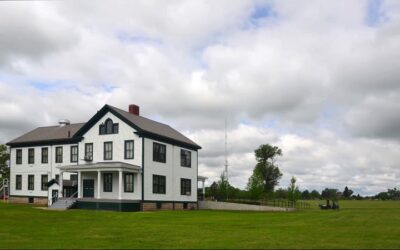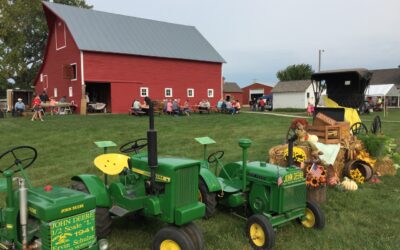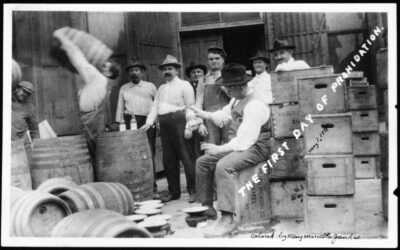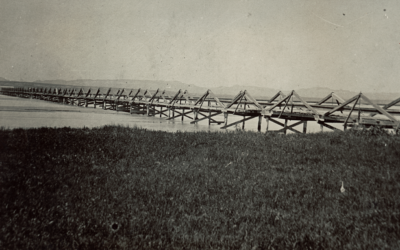NEBRASKA STATE HISTORICAL SOCIETY MANUSCRIPT FINDING AID
RG1999.AM: Harvey Wesley Hardy, 1825-1913
Papers: 1826-1913
Perry, Wyoming County, New York; Lincoln, Lancaster County, Neb.: Merchant; civic leader
Size: 1.0 cu.ft.; 2 boxes
BIOGRAPHICAL NOTE
Harvey Wesley Hardy (1825-1913), a pioneer Nebraska merchant, civic leader, and temperance advocate, was born at Perry, New York, in 1825. His parents, Samuel and Polly Parker Hardy were married in Rutland, Vermont on November 14, 1805. Samuel Hardy worked in a marble quarry for several years before purchasing a farm near Perry in the Genesee River Valley of western New York. After establishing the family farm, Samuel also started a potash factory at the outlet of Silver Lake. Over the next several years he would haul loads of potash to Albany.
Samuel Hardy was drafted into military service in 1813 and fought at the Battle of Black Rock. The following year he was wounded at the Battle of Lundy’s Lane. After being wounded, Samuel returned to the family farm. Samuel and Polly Hardy had ten children. Harvey Wesley Hardy was born on October 29, 1825, the same year his eldest sister Elmina died. The Hardy family sold the farm in 1830 and moved to Gainesville, New York.
Harvey attended public schools until he was seventeen when he entered a normal seminary and later attended Genesee College at Lima, New York. He became superintendent of schools in his hometown and later served as county superintendent. He returned to the family farm, where he continued to farm until 1868. At that point he moved to Aurora, Illinois where he engaged in the furniture business. After two years he left Illinois and settled in Lincoln, Nebraska, where he started another furniture business.
Harvey Hardy married Charlotte Abbott of New York on June 6, 1855. She died on March 19, 1897. They had three sons, Clement A.; Emory E.; and William C.; and one daughter, Cora. Hardy’s daughter Cora married Thomas Calvert, former Chief Engineer for the Chicago, Burlington & Quincy Railroad (See RG1998.AM). Hardy’s grandson, Philip Seacrest Hardy, eventually took over the furniture business (See RG2000.AM).
At first a Whig, Harvey Hardy joined the Republican Party in its early days, and was elected mayor of Lincoln on the Republican ticket in 1877 and again in 1878. In 1884 he joined the Prohibition Party and ran on the Prohibition Party ticket for the Nebraska State Senate in 1884 and for governor in 1886. In the gubernatorial race he polled 8,175 votes, approximately six percent of a total of 138,209. In 1896 he became a Democrat and supporter of William Jennings Bryan.
Always interested in temperance, Hardy as mayor of Lincoln was the originator of the high license city ordinance of 1877, which decreased the number of saloons from twenty-two to five by raising the liquor license fee to one thousand dollars, the highest figure then authorized by state law. This ordinance formed the basis for the state license law of 1879. Partly as an outgrowth of his interest in temperance, Hardy promoted the establishment of a Lincoln public library. In 1877, during his first term as mayor, the city took charge of a library established several years before in 1875. Temperance advocates hoped that such facilities would substitute for saloons as meeting places and leisure centers.
Hardy was a skillful writer and served for a time as editor of the New Republic, a prohibition newspaper published in Lincoln. During his later years he devoted most of his time to writing, travel, gardening, and speaking on various public issues. Harvey Wesley Hardy died in Lincoln, Nebraska on January 10, 1913.
SCOPE AND CONTENT NOTE
This collection consists of material relating to the Hardy family and particularly to the life and activities of Harvey Wesley Hardy, dating between 1826 and 1913. The collection includes correspondence, a few diaries, numerous manuscripts and drafts of articles, lectures, and speeches; as well as scrapbooks and newspaper clippings. The majority of materials in box 1 consist of correspondence from family and friends of Harvey and Charlotte Hardy. Some of the correspondence also relates to Harvey Hardy’s business and political activities.
The manuscripts appear to be mostly drafts of articles that Hardy wrote for various newspapers. Some of the subjects covered include temperance and prohibition, women’s suffrage, and the silver question. Many of the scrapbooks in box 2 contain copies of the published newspaper articles written by Hardy.
DESCRIPTION
Box 1
Folder
-
- Correspondence, 1848
-
- Correspondence, 1850 (Charlotte R. Abbott)
-
- Correspondence, 1853-1854
-
- Correspondence, 1855-1864
-
- Correspondence, 1865-1868
-
- Correspondence, 1872-1873
-
- Correspondence, 1887-1888,1891
-
- Correspondence, 1908-1909
-
- Correspondence, n.d.
-
- Diaries, 1897-1908
-
- Manuscripts, pt. 1:
-
- “The Great Study,” 14 pgs. (2 copies)
-
- “Our grand country,” 10 pgs.
-
- Untitled, “We are not here as a professional lecture.” 4 pgs.
-
- “My Country: Her Glory and Her Shame,” 30 pgs.
-
- “God’s Politics and the Christans [sic] Ballot,” 13 pgs.
-
- “Vested Rights,” 1 pg.
-
- “Sumptuary Law,” 1 pg.
-
- “Sunday Talk,” 1 pg.
-
- “Prohibition, a Church Question,” 5 pgs.
-
- “The Republican Party,” 1 pg.
-
- “Democrat Party,” 2 pgs.
-
- Untitled, “Is the republican party any better than the democrat?” 2 pgs.
-
- “Liquor Question Chief,” 3 pgs.
-
- “The Evils of drink,” 3 pgs.
-
- “Personal Liberty,” 2 pgs.
-
- “Regulate the Evil,” 2 pgs.
-
- “High License,” 1 pg.
-
- “Higher Law,” 2 pgs.
-
- “An Old Forty-Niner And What Became of Him,” 3 pgs. (incomplete)
-
- “One of Grandpa’s Stories: Sleeping by a Log,” 5 pgs.
-
- “Alone with a Panther,” 10 pgs.
-
- Woman Suffrage, “All rights and privilege and protection to all,” 15 pgs.
-
- “$20.00 Per Month,” 17 pgs.
-
- “Rights and Wrongs,” 8 pgs.
-
- “Equality Before the Law,” 10 pgs.
-
- “Two Girls and a Bear,” 15 pgs.
-
- “Arizona Indians: Their Queer Primitive Customs,” 14 pgs.
-
- “The Two Homesteaders,” 41 pgs.
-
- John B. Finch biography, 34 pgs.
-
- “Eulogy: John B. Finch,” 6 pgs.
-
- “John B. Finch: His Personal Characteristics,” 9 pgs.
-
- Manuscripts, pt. 1:
-
- Manuscripts, pt. 2:
-
- “To Nebraska from the Genesee Valley,” 7 pgs.
-
- “The Slave Ship,” 31 pgs.
-
- Gold vs. Silver, “Sir John Thurston…,” 8 pgs.
-
- “For the New York Voice,” (The silver question…) 3 pgs.
-
- “The Blue Jay and Shrike, A Bird Duel,” 11 pgs.
-
- “Chickens and Eggs,” 14 pgs.
-
- “A Bear and Panther Duel,” 10 pgs.
-
- “Dearer than a Brother,” 8 pgs.
-
- “He Loved but One,” 22 pgs.
-
- “Undying Love,” (He Loved but once) 3 pgs. (typescript)
-
- Temperance Lecture notes
-
- Misc. notes, drafts, and fragments
-
- Manuscripts, pt. 2:
-
- Newspaper clippings regarding silver
-
- Newspaper clippings, columns in The Independent
-
- Newspaper obituaries for Harvey Wesley Hardy, 1913 (see oversize)
Box 2
Folder
-
- Scrapbook of clippings, election returns and platforms, 1842-1892 (see oversize)
-
- Daybook, 1826-1840 (see oversize)
-
- School math problem book (David D. Thomas), 1828
-
- School math problem book (David D. Thomas), 1828
-
- Scrapbook of essays, daily record, obituary clippings, etc.
-
- Scrapbook of editorials by Harvey Wesley Hardy
-
- Scrapbook of editorials by Harvey Wesley Hardy
-
- Scrapbook of clippings and essays
-
- Scrapbook of clippings and poems
ADDED ENTRIES:
Hardy, Harvey Wesley, 1825-1913
Hardy Family (Lincoln, Neb.)
Lancaster County (Neb.) — History
Lincoln (Neb.) — History
Merchants — Nebraska
07-12-2007 Revised TMM/tmm
01-08-2008 Revised TMM/tmm




